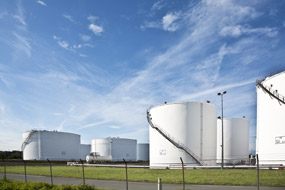Aiming to be energy independent in case of crisis
Obligation for strategic oil reserves
 Although oil consumption has dropped by 6% in France over the last twenty years, oil remains a major energy source which covers 32% of French energy needs. However more than 95% of the crude oil consumed in France is imported. It is in this context that public authorities established a policy on strategic oil stocks to face a serious rupture in supplies in the event of an international oil crisis. Because of a heavy dependence on oil and vulnerability to supplies, most industrialized countries, into natioanl framework, set up ways to secure reserves within an international framework early on. As a result, a directive of December 1968 initially defined the rules and minimal methods applicable to each Member State of the European Union. Then, the majority of the developed countries joined the International Energy Agency (IEA), founded in 1974, to which France joined in 1992.
Although oil consumption has dropped by 6% in France over the last twenty years, oil remains a major energy source which covers 32% of French energy needs. However more than 95% of the crude oil consumed in France is imported. It is in this context that public authorities established a policy on strategic oil stocks to face a serious rupture in supplies in the event of an international oil crisis. Because of a heavy dependence on oil and vulnerability to supplies, most industrialized countries, into natioanl framework, set up ways to secure reserves within an international framework early on. As a result, a directive of December 1968 initially defined the rules and minimal methods applicable to each Member State of the European Union. Then, the majority of the developed countries joined the International Energy Agency (IEA), founded in 1974, to which France joined in 1992.
Level of strategic reserves set by the IEA
Every member of the IEA must maintain permanent oil reserves. Each country decides on the ways and management of its reserves. Three principal systems exist:
- private reserves: strategic reserve obligations are held entirely by private operators.
- state reserves: strategic reserve obligations are handled entirely by the state.
- reserve agencies: the strategic reserve obligation is handled by an agency which receives payments from operators to cover its costs.
France handles its reserves through a combination of operators, of stocks constituted by SAGESS, of tickets and european tickets purchased by CPSSP.
France joined the International Energy Agency (IEA) in 1992. It must guarantee more than 90 days’ worth of net crude oil imports and oil products, that is a volume of strategic reserves equivalent to a percentage of the inland consumption of the preceding year (28.5% as of July 1st, 2011 and 29.5% as of July 1st, 2012 as a consequence of the adoption by France of the European Diective on strategic stocks).
